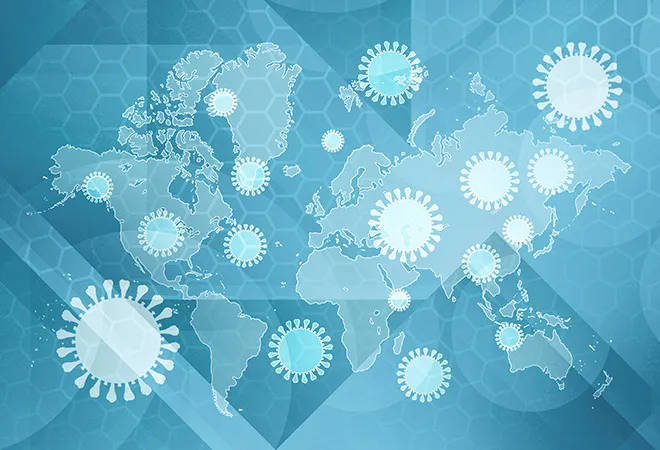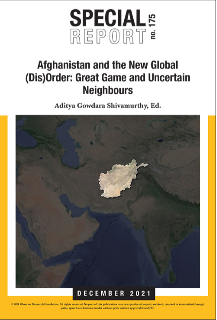
If we talk about public health, many Chinese cities adopted lockdown policies wherein citizens were advised to stay at home in February to minimize the spread of the epidemic. The Chinese citizens strictly followed this rule and as a consequence China has almost controlled the novel coronavirus in March. As the risk rises now, with the growth of the imported cases, especially in metropolitans such as Beijing, Shanghai, Guangzhou and Shenzhen, as well as the cities in the border. It indicates that no country can beat the novel coronavirus alone, especially when currently it is still far away to reach the peak of epidemic globally.
We have very limited understanding about this epidemic, such as how, when and where it starts to spread in the world. Even now, scientists don’t know either and it could have been existed in many countries for several years. At the very beginning, there is insufficient understanding about this super epidemic for the governments in China and the globe, so it is hard for them to make perfect decisions.
In China, Britain, European Union and United States the epidemic exacerbated due to the unconscious neglect of local governmental leaders to some extent initially. The numbers of confirmed cases and deaths in China, United States, United Kingdom, Japan, and almost every country, could be underestimated. Several cases have been excluded as regular influenza and pneumonia, such as cases in Italy or United States. Media supervision on government is necessary but if journalists take too much time criticizing the gap between the official posted number and the figure in their minds, rather than trusting the conclusions from the scientists in the frontier, their critics is meaningless. Anyway, the effective experience in Wuhan and China have been approved. The world should exchange information with China as soon as possible. There are at least six points that could be adopted by the globe.
The basic medical research, such as gene sequencing, is the first step. It has been conducted by several different scientific teams in Wuhan, Beijing and Shanghai in January and it provides the evidences about its potential origin and epidemiological characteristics, as well as the guidance on diagnosis and treatment, especially the R&D of test and vaccine products.
Second step is the efficiency of the governments. After the chaos of initial stage of the provincial and municipal governments, the following countermeasures under the instructions of the central government, including the decision-makers of China, National Health Commission (NHC), Central Disease Center (CDC), are quick and effective, such as city lockdown, strictly protect and control in the communities, leave no patient unattended.
Third step is digital technology. The health code, mainly provided by Tencent and Alibaba, is the certificate for the residents to in and out their communities. Considering that it just reflects the present health situation and doesn’t have a unified code nationally. Besides, the robotics in the hospital and remote medical system based on 5G also are interesting and helpful, when we already have sufficient doctors and nurses. The fascinating technology is not the pivot role against novel coronavirus at the peak time in February — the doctors and nurses are the key. However, it is convenient for the public and the local managers of the government and communities.
Fourth step is active international collaboration. After achieving the gene sequencing, China shared it with WHO almost the same day. Chinese leaders had several calls with their global counterparts, almost every week from January on. At the initial stage they exchanged information on the situation in China, but after March, the Chinese leaders need to response the aid-requests globally. A country alone, can’t fight against the virus – be it China or the United States. The department of foreign affairs must organize a series of technology exchange workshops online amongst Chinese (mainly from NHC and CDC) and the global public health officials and expertise. One won’t mind whether it is the soft power export or not (criticized by some of journals as well), it is important to guide the global less-experienced doctors and officials to save lives, as how to construct mobile hospitals and gather the national medical resources together as soon as possible, including military and private companies.
Fifth step is public education. There are a few protective measures for the public in Beijing, especially the foreigners, that include frequently cleaning hands and taking temperature, wearing the face mask, disinfecting home and office with alcohol, keeping distances with the others during eating and walking, staying at home when feeling unwell and seeking medical advices plus sharing travel history. It is not difficult to follow for the individuals, but not easy to convince all citizen to follow. Furthermore, I am sure every city in China will allocate a professional public health team soon, as a standard in the hospital. It has been a part of the national security system.
Sixth step is the recovery of the economy. In March and April, when the epidemic is fading in China, the urgent challenge is the recovery of the social order and urban economies. In China, a lot of immigrants were born in the hinter lands, such as the provinces of Yunnan, Guizhou or Sichuan, but worked in the coastal provinces, such as Guangdong, Zhejiang and Jiangsu. Most of them returned home during Spring Festival in January. Originally, they need to be back in February, but due to the epidemic they are unable to leave their hometowns.
The coastal governments tried their best to take them back to support the local private companies. For example, some cities provided subsidies to the immigrant workers directly 1000 RMB/per person, if they reach the factories before the settled date. Some cities even arranged the special fast-trains or flights to pick the workers up to return. Central government also published a series of new infrastructure plans to fight against the economic downturn after this wave of economic and public health crisis, including 5G, ultra-high-voltage power facilities, inter-city transport, vehicle charging stations, big data centers, artificial intelligence, and industrial internet. This is not going to be a smooth path for China. Under the pressure of supply chain disruption and attacking the industries of retail, transportation and tourism globally, China must heavily rely on its domestic market, and maintain its export from the regular goods to urgent medical materials which needed by the globe.
There are not many tools left, including fiscal and financial, in the kit for the global governments now, for example after cutting the interests rate one by one. But what we can rely on except collaboration? We must guarantee the global public health facilities supply chain, before we have the real vaccine which could be put into the market 6-12 months later and at that point it could be virus mutation.
China now has been the center to export medical facilities and materials, from face mask to medical ventilator (just donate 170,000 personal protection equipment to India on 6th April). However, the bottleneck of full production capability is subject to the stability of the global supply chain. For example, some key components, such as chips or sensors, of medical ventilator are provided by the epidemic areas, such as Italy, Germany and United States, which now the supply chain could be disrupted. Before the completed recovery of the supply chain, the sad reality is that the loss of the lives will continuously grow due to lack of appropriate curing in epidemic areas globally.
China sent several medical teams to Iran, Iraq, Serbia and Italy in March, Kazakhstan, Myanmar and Philippine in early April. Cuba, Russia, Albania and Poland also sent their medical teams to aid Italy. Germany, France and Britain are to be less worried about. The worse scenario is that if the epidemic is out of control in developing countries, the world will suffer a complete disaster. All countries, not just China, as long as they have powerful medical resources even epicenters of the virus like Britain, France, Germany and United States, should send aid to the South Asian countries (such as India and Bangladesh) and Africa (such as Ethiopia and Nigeria). Many infectious cases haven’t been accounted for due to lack of testing facilities. Considering the huge population basis and poor sanitation system these areas, the potential cases could have an exponential increase.
If we look at the earth science and the environment we are living in currently, the expansion of the anthropogenic activities could lead to a series of epidemics and this time it is a good chance to warn human.
China has suffered from the relationship between human and masked civet during SARS in 2003. After the breakout of the novel coronavirus this year, Chinese National People's Congress published legislation in February in 2020 to prohibit illegal wild animal deal and many cities also followed it up. For example, according to the local regulation in Shenzhen and Guangzhou, the restaurant which sold illegal wild animals will be fined at the cost of 30 times of the case-related objects at most, respectively. Further revoking the license or taking legal liabilities. We can see the similar cases due to the unlimited anthropogenic activities in the habitats of the bats (Ebola virus in Africa, MERS virus in Middle East and Nipah virus in South Asia).
. It is no sign to demonstrate that the greenhouse gas emission globally will slow down. Although some politicians and interests-groups insist that there is no significant connections between global warming or disasters and anthropogenic activities, but more and more punishments from the earth, such as degradation of the biodiversity and habitats, storm, flood, hurricane extreme hot and cold, have occurred and some of them could lead to public health events to weaken the capability of human’s adaptation strategies.
For the local government in any countries, they have no intention to abolish policies or limit residents to capture the natural resources policies. For example, many peasants or low-income families still survive in the generosity of the nature, such as slash-and-burn or special-type economic animals breed. Or, the difficulties of poverty alleviation will be aggravated in Asia, Africa and Latin America.
Like the public health crisis, if we want to fight with the challenges from the nature induced by indulged anthropogenic activities, the global collaboration is necessary or the pre-requisite.
Like the public health crisis, if we want to fight with the challenges from the nature induced by indulged anthropogenic activities, the global collaboration is necessary or the pre-requisite.
From the view of the geopolitics, one year ago, a series of Chinese leading manufacturing enterprises, which provided numerous high-quality jobs, have been sanctioned by the United States Administration. There is no concern regarding the disputes between the governments, even if it accelerates the decoupling between China and United States. First reason is that, it is impossible to cut most of the connections, considering the solid need of governance collaboration and economic feasibility of global labor-division. Second reason is that it is not a major issue to decouple some supply chains between the countries. For example, it is reasonable for the United States and all the other countries to reconstruct strategic industries supply chain in their own lands for a reliable and constant supply for when situations like a pandemic take place. Third reason is that, for any county, the governments have intentions to create outside conflict to transfer the domestic attentions during the crisis.
However, one could be worried about the distrusts amongst the people. For example, MIT Technology Review expressed a positive standpoint towards the performances in against novel coronavirus by Chinese, but several citizens of the United States and media criticized this news. We don’t want to judge who is right or wrong, but if people have no trusts among each other, even though it is the right recommendations from the other side, there will be higher costs to collaborate or communicate together to fight with the challenges from the public health and climate changing. The English term beggar-thy-neighbor effect just partially expresses this scenario.
There is a higher possibility to see more regional conflicts after the crisis because the globalization could be reversed. The trade war between China and U.S. in 2019 and global epidemic in 2020 could just be the start. Challenges from the public health, earth science and geopolitics cannot be tackled by a single nation, following that people in developing countries could survive tougher due to less business opportunities. Domestic economic pressure will continuously grow, especially considering not enough burst of the new technology. The hot topic such as 5G is not the revolution technology and the expected prosperous industry related to 5G is still not mature. There is a bit low expectation on the job offering and social stability after epidemic. Global governments need to find structural opportunities, from smart city to regional integration, during the times of regionalization.
An important question that comes up is – Can we collaborate for a sustainable development globe to fight with the questions from the public health and earth science, rather than spending time on arguing the politics, for example which national institutional system is better or worse between democracy and authoritarianism? The answer is not optimistic for the most global thinkers. It is human nature to make more arguments with each other. We would still like to believe: global collaboration is the only way to pass the danger zones in 21st century, especially frequently occurring disasters and conflicts but, if any governments and organizations would like to work with us to try to change it, We would be happy to shake hands with them. It is the other side of the human nature: persistence, tough, kindness and responsibility, for the history, current times and the next generation.
The views expressed above belong to the author(s). ORF research and analyses now available on Telegram! Click here to access our curated content — blogs, longforms and interviews.




 PREV
PREV


